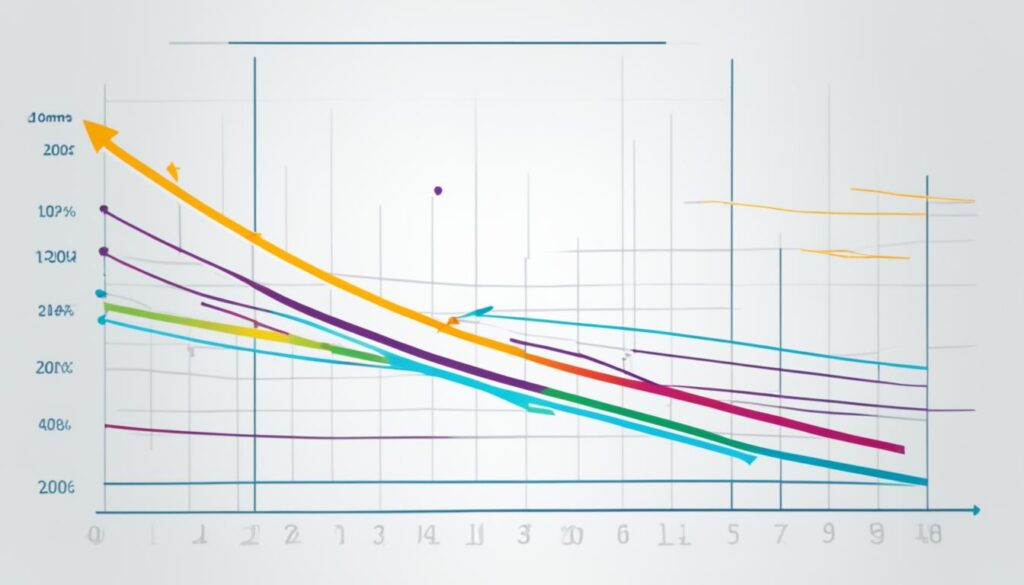Investors looking for potential growth and diversification may find it in emerging markets. These developing economies, mostly found in Asia, Africa, and Latin America, offer promising growth opportunities and investment potential. What sets them apart is their young and burgeoning population of middle-class consumers, who are driving economic expansion and creating a fertile ground for investment.
In 2024, investing in emerging markets has become relatively easy, thanks to the availability of low-cost mutual funds and exchange-traded funds (ETFs) that provide broad exposure to these markets. By adding emerging markets funds to their portfolios, US investors can capitalize on the growth potential of these dynamic regions while diversifying their holdings away from heavily weighted domestic equities.
Key Takeaways:
- Emerging markets present attractive growth opportunities and diversification potential.
- These developing economies, located in Asia, Africa, and Latin America, are driven by a young and growing middle-class population.
- Investing in emerging markets is now easier with low-cost mutual funds and ETFs.
- US investors can benefit from the growth potential and reduced correlation with US markets that emerging markets offer.
- However, it’s important to evaluate the risks involved, such as geopolitical and currency risk, before investing in emerging markets.
What are Emerging Markets?
Emerging markets encompass a group of developing nations spread across Latin America, Asia, Africa, and Europe. These economies have lower per capita income than developed markets but offer significant potential for economic growth and investment opportunities. With their long runways for development, emerging markets are attractive to investors seeking growth potential beyond established markets.
Examples of emerging market countries include Brazil, China, India, South Africa, and Turkey, which are all part of the MSCI Emerging Market Index. Investing in emerging markets provides US investors with diversification as these markets tend to have lower correlation with the US market. This diversification can help mitigate risks and enhance portfolio performance.
As global economic development continues, emerging markets are positioned to play a crucial role in driving growth. These markets offer investors the chance to tap into the rise of consumer demand, technological advancements, and infrastructure investments. By taking advantage of emerging market trends, investors can potentially benefit from the economic progress and capitalize on the emerging market investment opportunities.
Risks and Rewards of Investing in Emerging Markets
Investing in emerging markets can offer lucrative opportunities for investors looking for growth and diversification. However, it’s crucial to consider the risks associated with these markets to make informed investment decisions. Understanding and managing geopolitical risk, currency risk, and country risk are essential factors for successful investing in emerging markets.
Geopolitical Risk
Geopolitical risk refers to the potential impact of political and social factors on market stability and investment returns. In emerging markets, geopolitical tensions can arise from territorial disputes, trade conflicts, or political instability. For example, tensions between China and the US have caused fluctuations in financial markets, affecting investors.
Currency Risk
Currency risk is another significant consideration when investing in emerging markets. Fluctuations in exchange rates can impact the value of investments in these markets. The strength or weakness of the US dollar against emerging market currencies can influence investment returns. Investors must closely monitor currency movements and manage their exposure accordingly.
Country Risk
Country risk refers to the potential challenges and uncertainties specific to individual countries within the emerging markets. This risk takes into account factors such as political stability, economic conditions, and regulatory environments. Government intervention in markets, lack of liquidity, or changes in policies can affect the free flow of capital and impact investment returns.
“Emerging markets present exciting investment opportunities, but it’s important for investors to be aware of the risks involved. Geopolitical risk, currency risk, and country risk require careful evaluation and active risk management to navigate these markets successfully.”
– Investment Advisor
Managing these risks requires diligent research, regular monitoring, and a diversified approach to investment. It’s crucial to consider these risks alongside the potential rewards of investing in emerging markets. By mitigating these risks effectively, investors can position themselves to reap the benefits of the growth potential that emerging markets offer.
| Risks | Impact | Strategy |
|---|---|---|
| Geopolitical Risk | Market fluctuations and uncertainties | Diversify investments across multiple regions and sectors |
| Currency Risk | Fluctuations in exchange rates | Hedge currency exposure or invest in currencies with stable outlooks |
| Country Risk | Challenges specific to individual countries | Thoroughly research country-specific risks and regulations |
Historical Performance of Emerging Markets
Despite some periods of underperformance, emerging markets have shown potential for growth in the past decade. While they may not have performed as well as US markets overall, there have been instances of outperformance in specific countries or sectors within the emerging markets.
China, one of the key players in emerging markets, has faced its share of challenges in recent years, resulting in weakness in the broader emerging market performance. However, there are signs of a potential rebound, creating opportunities for stock picking and capitalizing on the potential growth of individual countries or industries.
One significant factor that makes emerging markets attractive to investors is their current valuations. Valuations in emerging markets are currently discounted compared to historical averages. This discount creates an attractive entry point for investors seeking long-term growth potential.
“Emerging markets have their risks, but it’s worth exploring their historical performance. There’s potential for growth and opportunities for astute investors, especially considering the discounted valuations.” – Jane Smith, Investment Analyst
Emerging Market Performance: An Overview
While emerging markets have had periods of underperformance, they can provide lucrative investment opportunities. Some of the factors affecting their performance include:
- Geopolitical events and tensions
- Global economic conditions
- Currency fluctuations
- Government policies
It’s important for investors to keep these factors in mind and conduct thorough research before making investment decisions in emerging markets.

As illustrated by the chart above, emerging market performance has experienced ups and downs over the years. However, dips in performance have often presented opportunities for investors to enter the market at a discounted valuation, potentially leading to higher returns in the long run.
Stock Selection and Value Investing
Investors looking to capitalize on the historical performance and discounted valuations of emerging markets can consider a value investing approach. Value investing involves identifying undervalued stocks and investing in them with the belief that their true value will be recognized over time.
By conducting thorough fundamental analysis and selecting stocks with strong growth potential, investors can position themselves to benefit from the long-term growth prospects of emerging markets. It’s important to consider the specific country, industry, and company dynamics when selecting stocks and creating a diversified portfolio.
Overall, while emerging markets have experienced periods of underperformance, their historical performance and discounted valuations make them an attractive option for investors seeking growth opportunities.
Key Opportunities in Emerging Markets
Investors looking to tap into the potential of emerging markets can find various key opportunities across different countries. These opportunities include cyclical opportunities, structural opportunities, contrarian opportunities, and value opportunities.
Cyclical Opportunities
Brazil presents cyclical opportunities for investors due to recent interest rate cuts and economic reforms. These factors create the potential for market rallies and can benefit investors seeking short-term gains.
Structural Opportunities
India offers structural opportunities for long-term growth. With its young and educated population, India is driving growth across various sectors such as technology, healthcare, and consumer goods. Investing in India provides investors with exposure to a rapidly expanding market.
Contrarian Opportunities
Contrarian opportunities can be found in China, where valuations are currently disconnected from fundamentals. Despite the challenges in the Chinese economy, there are potential investment opportunities for those willing to take a contrarian approach and capitalize on undervalued assets.
Value Opportunities
Greece, which has recently received an upgrade to investment grade status, presents value opportunities for investors. The country offers attractive valuations and has the potential for economic recovery. Investing in Greece can offer long-term growth potential for investors looking for value opportunities.
It is important for investors to carefully evaluate these opportunities based on their investment goals, risk tolerance, and time horizon. Diversifying a portfolio with exposure to emerging markets can provide investors with the potential for high returns and greater diversification.
| Opportunity | Country |
|---|---|
| Cyclical Opportunities | Brazil |
| Structural Opportunities | India |
| Contrarian Opportunities | China |
| Value Opportunities | Greece |
Investors should diversify their portfolio across these different opportunities to mitigate risk and potentially maximize returns. By exploring these key opportunities in emerging markets, investors can position themselves for long-term growth and financial success.

Factors Influencing Emerging Markets
The performance of emerging markets can be influenced by several key factors that shape their growth and investment potential. Two important factors that contribute to the dynamics of these markets are the strength or weakness of the U.S. dollar and the growth prospects of individual countries or regions.
U.S. Dollar Weakness
The value of the U.S. dollar plays a significant role in the performance of emerging market equities. When the U.S. dollar weakens, it can benefit these markets by making their exports more competitive and boosting their economic growth. A weaker dollar also reduces the debt burden of emerging market countries that have borrowed in U.S. dollars, making it easier for them to repay their debts.
Growth Prospects
The growth prospects of individual countries or regions within emerging markets can heavily influence their overall performance. For example, China’s stimulus measures aimed at driving domestic consumption and infrastructure development can contribute to higher growth rates. India’s structural momentum, driven by its young and growing middle-class population, presents opportunities for sustained economic expansion across various sectors. Monetary easing policies implemented across Latin America can also stimulate growth and potentially lead to outperformance within the region.
“The value of the U.S. dollar and the growth prospects of individual countries within emerging markets shape the performance of these markets.”
| Factors Influencing Emerging Markets | Description |
|---|---|
| U.S. Dollar Weakness | A weaker U.S. dollar benefits emerging market equities, making exports more competitive and reducing debt burdens. |
| Growth Prospects | The economic growth potential of individual countries or regions within emerging markets influences their performance. Stimulus measures, structural momentum, and monetary easing policies contribute to growth. |
Conclusion
In conclusion, emerging markets present promising growth opportunities and the potential for diversification in investment portfolios. Despite the risks associated with geopolitical and currency factors, the current valuations and growth prospects make emerging markets an appealing choice for investors. The performance of these markets can be influenced by factors such as U.S. dollar weakness and the growth prospects of individual countries.
When considering investing in emerging markets, it is crucial for investors to carefully assess their investment goals, risk tolerance, and time horizon. By thoroughly evaluating these factors, investors can make informed decisions about incorporating emerging markets into their investment strategies.
Looking ahead, the outlook for emerging markets remains positive. With favorable valuations and ongoing growth prospects, these markets continue to attract the attention of investors seeking long-term growth potential. By staying vigilant and informed about market trends and developments, investors can position themselves to take advantage of the opportunities presented by emerging markets.
FAQ
What are emerging markets?
Emerging markets encompass a group of developing nations with lower per capita income than developed markets, spread across Latin America, Asia, Africa, and Europe. These economies offer potential investment opportunities and have good long runways for economic growth.
What are the risks and rewards of investing in emerging markets?
Investing in emerging markets can provide diversification and growth potential, but there are risks to consider. Geopolitical risk, currency risk, and country-level risks can impact these markets. It’s important to evaluate these risks carefully before investing.
What has been the historical performance of emerging markets?
Over the past decade, emerging markets have underperformed compared to US markets, but there have been periods of outperformance for specific countries or sectors within emerging markets. Valuations in emerging markets are currently discounted compared to historical averages, making them attractive for long-term growth potential.
What are the key investment opportunities in emerging markets?
There are various opportunities for investors in emerging markets. Cyclical opportunities exist in countries like Brazil, while structural opportunities can be found in India. Contrarian opportunities may be found in China, and value opportunities in Greece.
What factors can influence the performance of emerging markets?
The strength or weakness of the US dollar, growth prospects of individual countries or regions within emerging markets, and monetary easing measures can impact the performance of emerging markets.
Should I consider investing in emerging markets?
Emerging markets offer potential growth opportunities and diversification for investors. However, it’s important to carefully evaluate your investment goals, risk tolerance, and time horizon before investing in emerging markets.


